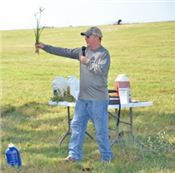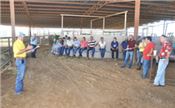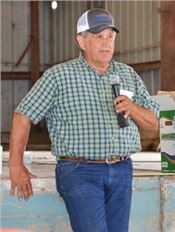Experts Offer Advice On Choosing Replacement Beef Heifers
MANGHAM, LA.
Sound replacement heifer selection is essential to running an efficient cow-calf operation, an LSU AgCenter cattle expert said at a field day on Sept. 15.
Goals for replacement heifers include calving unassisted each year, reaching puberty and breed in the first 21 days of their first breeding season, and having sound teats, udders, feet and legs as well as a calm temperament, Jason Holmes said. The LSU AgCenter regional beef specialist spoke at the northeast Louisiana beef and forage field day at the Goldmine Plantation.
Keep older heifers born in the first 45 days of calving season because early-born heifers are older and often heavier at weaning, Holmes said. These early born heifers have a greater chance of becoming pregnant earlier in the breeding season.
The objective is to raise cows that will be able to rebreed quickly after calving. “We want her to be able to breed back and have a calf unassisted every year,” Holmes said.
Good records and weight monitoring are essential. “We need to know what they actually weigh to monitor growth performance,” he said.
Culling can be done based on body condition scoring for cows more than 10 years old, said AgCenter cattle researcher Ryon Walker. “If they can’t keep body condition at weaning, it’s going to be harder to get them back up at breeding time,” he said.
Fat heifers are not able to rebreed as quickly because of hormonal disruptions, Walker said.
Protein requirements are higher for younger calves, Walker said. Ryegrass is a good protein source that’s also high in energy and one that’s used at the LSU AgCenter Hill Farm Research Station in Homer. “We develop our heifers on ryegrass as soon as we can grow it,” he said.
Dr. Jacques Fuselier, LSU School of Veterinary Medicine professor and veterinarian, said parasitic worms can cause a cow to produce low-quality milk that will hinder calf development.
Deworming should be done in the fall, with follow-up treatments in the winter and spring, Fuselier said.
The entire herd should be treated, he said, and fecal egg counts can be used to determine dewormer effectiveness.
Keeping grass at least 4 inches tall helps control worms because the larvae tend to stay low on grass plants, he said.
Buttercup weed suppresses forage growth in the spring, but it can be controlled with December and January 2,4-D applications that will not damage white clover, said AgCenter weed scientist Ron Strahan.
Virginia buttonweed can be controlled with Grazon Next, and Remedy is effective on woody plants along fencerows, Strahan said.
ProwlH20 provides good control of barnyardgrass, crabgrass and pigweed in bermudagrass and bahia, he said.
Robert Riser, a cattle and poultry producer from Downsville, talked about his experience with video auctions to sell calves. The process provides a way of making extra income.
Riser arranges with other small producers to contract with buyers in the spring for late-summer delivery. “You’ve just got to have one or two good neighbors and you can get a load together,” he said
Buyers insist on good record keeping, and breeding and vaccinations have to occur on a schedule. “Everything you need to do to ship a load of calves makes you a better producer,” Riser said.
But he said the need for local sale barns remains. ∆

LSU AgCenter weed scientist Ron Strahan tells cattle
producers how to kill different weeds with the various
herbicides. He made his presentation at the northeast
Louisiana beef cattle field day at the Goldmine Plantation
near Mangham on Sept. 15.

LSU AgCenter regional beef specialist Jason Holmes
tells cattle producers about the criteria they could
consider when culling cows from their herds during
the northeast Louisiana beef cattle field day at the
Goldmine Plantation near Mangham on Sept. 15.

Robert Riser, a beef and poultry producer from Downsville,
talks about his experience selling calves through video sales
during the northeast Louisiana beef cattle field day at the
Goldmine Plantation near Mangham on Sept. 15.
Photos by Bruce Schultz